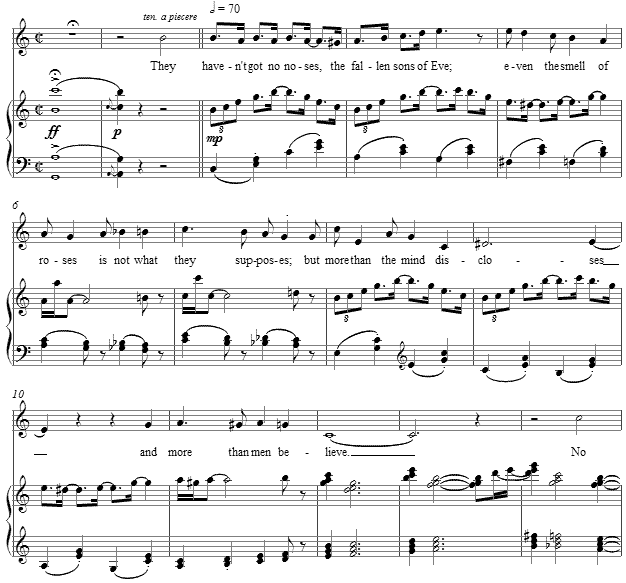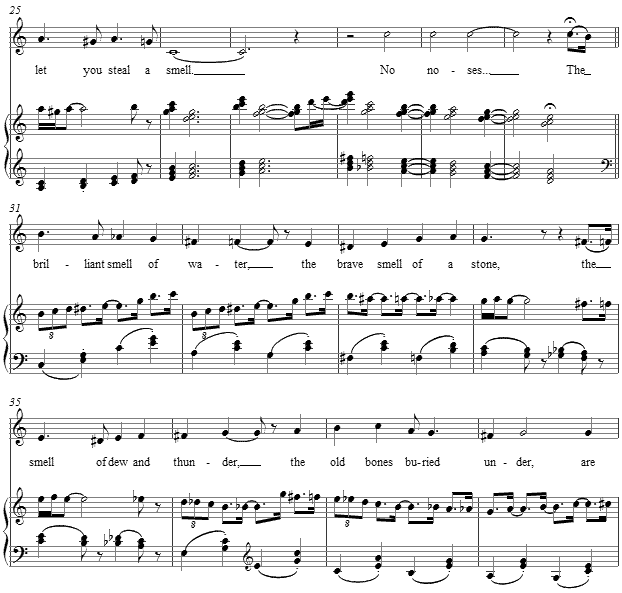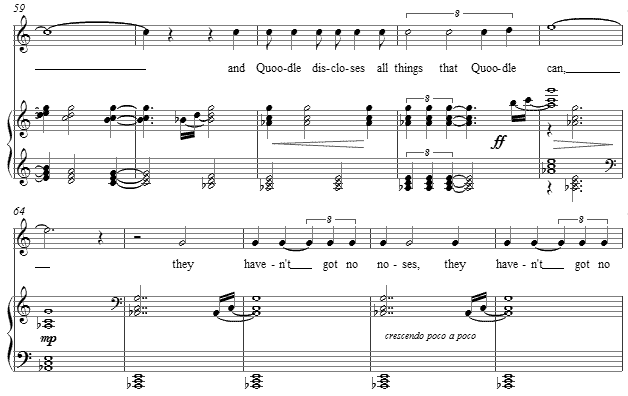Music and Texts of GARY BACHLUND
Vocal Music | Piano | Organ | Chamber Music | Orchestral | Articles and Commentary | Poems and Stories | Miscellany | FAQs
The Song of the Quoodle - (2007)
G. K. Chesterton
for medium voice and piano
They haven't got no noses,
The fallen sons of Eve;
Even the smell of roses
Is not what they supposes;
But more than mind discloses
And more than men believe.
They haven't got no noses,
They cannot even tell
When door and darkness closes
The park a Jew encloses,
Where even the law of Moses
Will let you steal a smell.
The brilliant smell of water,
The brave smell of a stone,
The smell of dew and thunder,
The old bones buried under,
Are things in which they blunder
And err, if left alone.
The wind from winter forests,
The scent of scentless flowers,
The breath of brides' adorning,
The smell of snare and warning,
The smell of Sunday morning,
God gave to us for ours
And Quoodle here discloses
All things that Quoodle can,
They haven't got no noses,
They haven't got no noses,
And goodness only knowses
The Noselessness of Man.[ 4 pages, circa 2' 20" ]
G. K. Chesterton
This seemingly odd text in the form of nonsense poetry is a castigation of human ego, as we discover that we are so often the "Quoodle." Chesterton writes a poem which he himself titles a "song;" it seemed only fitting therefore to have a song setting for this marvelous text.
With the vocal range of a tenth, this setting is within reach of most singers. It is a nonsense setting of nonsense poetry of a sort, with an underlying deep earnestness. Beginning in an appealing, music hall style, the lilt of the melody disguises the rhetoric addressed to us, as "the fallen sons of Eve." In a cut time feel, the setting is meant to evoke humor and a lack of seriousness.
The first two verses are rather identically set, with small modifications for the next two verses as the text itemizes that which we often miss in the rush and cluttered thoughts of our daily lives. Chesterton, while seemingly smearing Jews in his references echoing the prejudice of his era, even reminds that the "law of Moses" allows for the enjoyment of life's simple pleasures. Even still we seem to have "no noses." To quote a Jew who knew well the "law of Moses" therefore seems apt; Isaac Bashevis Singer wrote "Our knowledge is a little island in a great ocean of nonknowledge."
Given the rhetorical noise level of the world's various activists and political movements, it seems obvious that though the world swims in "a great ocean of nonknowledge," those who would tell us the modern "truths" pretend to hold vast knowledge, and yet by Chesterton's metaphor they "haven't got no noses, / And goodness only knowses / The Noselessness of Man."
We are speaking of ourselves in this sense, and humility is most warranted in that regard, for we know far less than we believe. To further illustrate this point, one need only heed the words of physicist Albert Einstein, who observed, "Whoever undertakes to set himself up as a judge of Truth and Knowledge is shipwrecked by the laughter of the gods."
The music hall style, mixing duple against triple rhythms, vanishes, as an accusatory tone is taken up resting on the often repeated augmented triad in the accompaniment, as the harmonic rhythm stands still, enabling us to emphasize the reminder that we fail to notice so much, all the while the ego "discloses all things that a Quoodle can." Even so, we are the Quoodle in Chesterton's words and therefore we so often our own worst and best enemy, just Walt Kelly's American comic character Pogo [ 1 ] reminded that he has met the enemy, and 'he is us' -- Chesterton reminds that we "haven't got no noses," and with this he descends into coarser, ungrammatical speech to emphasize this, repeating it.
The score for The Song of the Quoodle is available as a free PDF download, though any major commercial performance or recording of the work is prohibited without prior arrangement with the composer. Click on the graphic below for this piano-vocal score.
NOTES
[ 1 ] This is perhaps Walt Kelly's most famous Pogo quotation , "we have met the enemy and he is us." It quite well sums up his attitude -- and mine as well -- towards the foibles of man and the nature of the human condition. The quote is a paraphrase of a message sent in 1813 by U.S. Navy Commodore Perry after The Battle of Lake Erie stating, "We have met the enemy, and they are ours."
Kelly's paraphrase first appeared in a lengthier form in the foreword of the book The Pogo Papers.
Kelly wrote, "Specializations and markings of individuals everywhere abound in such profusion that major idiosyncrasies can be properly ascribed to the mass. Traces of nobility, gentleness and courage persist in all people, do what we will to stamp out the trend. So, too, do those characteristics which are ugly. It is just unfortunate that in the clumsy hands of a cartoonist all traits become ridiculous, leading to a certain amount of self-conscious expostulation and the desire to join battle. There is no need to sally forth, for it remains true that those things which make us human are, curiously enough, always close at hand. Resolve then, that on this very ground, with small flags waving and tinny blast on tiny trumpets, we shall meet the enemy, and not only may he be ours, he may be us."
This prose version is not well remembered, yet the simple line included in the comic strip itself gained resonance far greater than was ever expected. The finalized version of the quotation appeared in a 1970 anti-pollution poster for Earth Day, and also served as the title for the last Pogo collection released before Kelly's death in 1973, and of an environmentally-themed animated short Kelly had started work on, but was unable to finish due to ill health.



